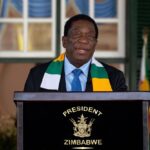While President Emmerson Mnangagwa’s office offered no official explanation for Moyo’s abrupt removal less than a week prior, ZANU-PF activist Rutendo Matinyarare has stepped forward with explosive allegations.
Matinyarare, a controversial figure with several defamation cases pending in Zimbabwean and South African courts, claims Moyo was compromised and colluded with French intelligence to undermine Zimbabwe’s security since his appointment in 2017. He alleges that this relationship stretches back fifteen years, originating during Moyo’s tenure as African Union (AU) executive secretary.
“For years, insiders within the AU and intelligence networks across Africa warned us of how Moyo was compromised, especially his alleged ties to French intelligence during his time as Executive Secretary at the African Union. But as a sitting head of intelligence, he was untouchable—until now,” Matinyarare revealed.
He sees Moyo’s dismissal as a sign that President Mnangagwa possesses sufficient intelligence to act decisively against those perceived as working against the nation’s interests. “This removal is proof that President Mnangagwa is armed with enough intelligence to act decisively against those working against the nation of Zimbabwe,” Matinyarare stated. “It signals the beginning of a critical cleanup within our security apparatus.”
However, Matinyarare’s accusations extend beyond allegations of foreign collusion. He directly accuses Moyo of actively hindering the Zimbabwe Anti-Sanctions Movement (ZASM), an organisation Matinyarare chairs, in its efforts to secure the removal of sanctions impacting Zimbabwean individuals and businesses.
“The greatest opposition to our anti-sanctions and anti-GMO campaigns came not from foreign enemies, but from the very institution that should have been our greatest ally—the CIO,” he declared.
Matinyarare paints a picture of internal sabotage, alleging that Moyo’s influence within the CIO led to the betrayal of individuals initially supporting the anti-sanctions campaign. These individuals, he claims, were subsequently manipulated into opposing ZASM’s anti-GMO efforts, aligning themselves with alleged smugglers of toxic GMOs, forex externalisers, and economic saboteurs.
“A few of those who initially stood with us in the fight against sanctions, were later turned against us in the anti-GMO fight, as they aligned themselves with smugglers of toxic GMOs, forex externalisers, and economic saboteurs on the instruction of Moyo and his inner circle,” he explained.
The accusations become even more serious with Matinyarare’s claim that Moyo and his associates were allegedly on the payroll of GMO smugglers, aiming to discredit Matinyarare personally for his opposition to their activities.
“Rumour has it that the DG and his close personal circle had been put on a hefty retainer by some of the GMO smugglers to destroy me, for daring to fight against their smuggling and forex externalisation operations,” he stated.
He concludes his statement with a plea for President Mnangagwa to eliminate the remaining members of Moyo’s alleged corrupt network, those he believes are on foreign payrolls or working against the nation’s economic recovery.
A different perspective emerges from Chris Maroleng, Founder and CEO of Africa 360, who offers a more nuanced analysis of the situation. While acknowledging the ripples caused by Moyo’s removal within Zimbabwe’s power structures, Maroleng frames the event within the broader context of the Mnangagwa administration’s struggles. He describes the move as a desperate attempt to mask the deep-seated problems of incompetence, rampant corruption, and a pervasive culture of paranoia within the government.
Maroleng argues that the root cause of Zimbabwe’s current political instability lies in the Mnangagwa administration’s ineffective social and economic policies. The government’s focus on self-enrichment and the relentless pursuit of power, he argues, has overshadowed any genuine concern for the welfare of the Zimbabwean people.
“At the crux of this political drama lies a damning truth: Mnangagwa’s chaotic governance is a direct consequence of his administration’s inept social and economic policies,” Maroleng asserts.
He paints a picture of a political elite engrossed in a web of corruption, draining public coffers while enjoying lavish lifestyles, neglecting the urgent needs of a nation in crisis.
Maroleng casts a critical eye on Matinyarare’s narrative, suggesting that while dramatic, it dangerously borders on conspiracy theory. He points out that Matinyarare’s claims might be self-serving, designed to deflect attention from the more pressing issue of the government’s systemic failures. He notes that it is unsurprising that Matinyarare felt sidelined during Moyo’s tenure, suggesting that Moyo was not one to tolerate incompetence.
“It’s no surprising that Rutendo felt sidelined during Moyo’s time in office, because from my personal experience with Moyo, he did not suffer fools easily,” Maroleng explains.
Maroleng offers a starkly different interpretation, highlighting the tragic consequences of the government’s failures. He cites Zimbabwe’s alarming cancer mortality rates as a direct result of catastrophic underinvestment in public health, exacerbated by the ZANU-PF’s siphoning of state resources.
“The reality is far more mundane and tragic: the staggering cancer mortality rates in Zimbabwe are not the result of foreign plots or sinister agricultural practices but rather the direct outcome of a catastrophic underinvestment in public health, compounded by the ZANU-PF’s relentless siphoning of state resources into the pockets of the corrupt elite,” he states.
He views Moyo’s removal as a futile gesture, a mere rearrangement of personnel within a failing system.
“The recent reshuffle within the CIO, particularly the sidelining of Moyo, can best be described as a futile gesture—a mere rearrangement of deck chairs on a sinking ship,” Maroleng concludes.
He argues that this is not a solution but a symptom of a regime gripped by fear, paranoia, and a profound disconnect from the realities faced by the Zimbabwean people. Mnangagwa’s increasing isolation, fueled by his own actions, has created a volatile environment with growing dissent within his party, the security apparatus, and broader society.
The looming specter of dissent casts a long shadow over 2025, a year that could bring either a long-overdue reckoning or plunge the nation further into despair. Maroleng questions Mnangagwa’s ability to resolve the crisis he has helped create.
While acknowledging the potential for reform within the corrupted institutions, he highlights the significant challenges in achieving meaningful change, given the ZANU regime’s tenacious grip on power and its unwillingness to confront the unsustainable nature of its rule.












